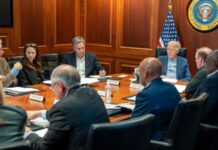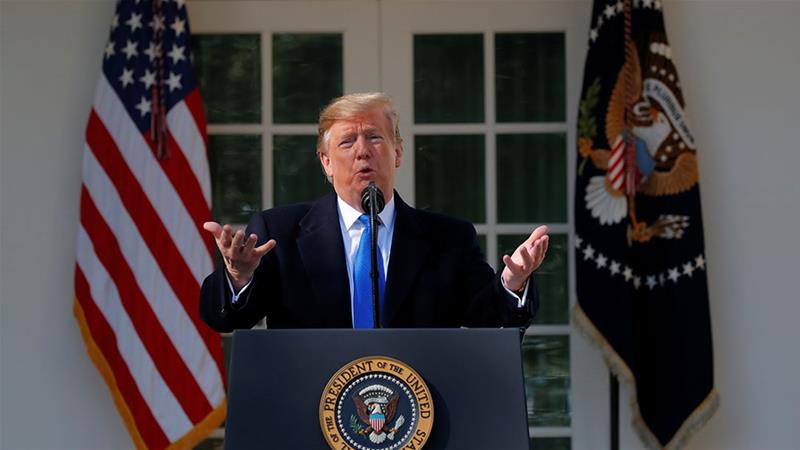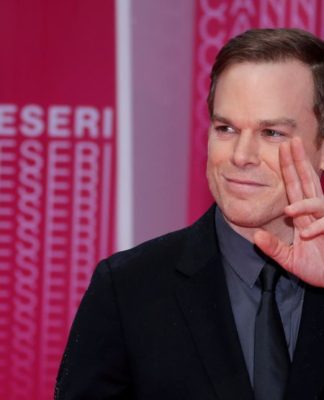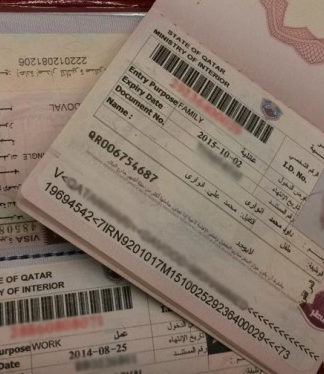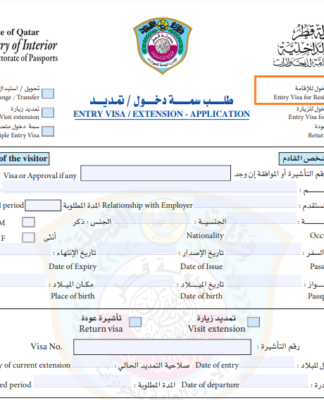Trump has refused to cooperate in numerous congressional probes, setting the state for several long court fights.
Washington, DC – US President Donald Trump is refusing to cooperate with several committees in the House of Representatives that have launched investigations of his presidency and business dealings, setting the stage for a legal confrontation that is likely to land in the US Supreme Court.
“We just went through the Mueller witch-hunt,” Trump told reporters at the White House on Wednesday. “And they came up with no collusion and they also came with no obstruction.”
“We are fighting all the subpoenas. These are not like impartial people. Look, the Democrats are trying to win 2020,” Trump told reporters after saying in a tweet earlier in the day he would take the issue “to the US Supreme Court.”
But constitutional scholars and Washington, DC, lawyers say Trump’s legal ability to fend off demands from the House, where opposition Democrats control key committees, is weak. The president can only delay Congress’s access by litigating in federal court, although that is a process that could take months.
What are the House investigations?
Since Democrats won control of the House in the 2018 elections, several committees have started expansive inquiries into Trump’s conduct in office, his tax returns and financial arrangements.
The Financial Services Committee is looking into Trump’s financial dealings. The Ways and Means panel has requested Trump’s tax returns. The House Foreign Affairs Committee has joined other committees in demanding documents related to Trump’s communication with Russian President Vladimir Putin.
The House Oversight Committee is examining a number of areas, including the administration’s handling of security clearances. The House Intelligence Committee has also launched its own investigation of Russia interference, as well as Trump’s connections to Russia. And the House Judiciary Committee is pursuing allegations against Trump of obstruction of justice, public corruption and abuses of power.
Mueller probe reports prompts subpoenas
Last week, Attorney General William Barr released a redacted version of Special CounselRobert Mueller‘s report of his investigation into Russian interference in the 2016 US presidential election.
The report said that Mueller’s probe did not establish the Trump campaign conspired with Russian operatives. The investigation did, however, examine “multiple acts by the president that were capable of exerting undue influence over law enforcement investigations”.
Mueller did not conclude that Trump committed obstruction of justice, but did not exonerate him either.
On Monday, the House Judiciary Committee issued a subpoena, an enforceable legal demand, for testimony from former White House Counsel Donald McGahn, who was a key witness for Mueller. The committee is demanding copies of the notes McGahn took in meetings with Trump.
According to Mueller’s report, Trump directed McGahn to fire the special counsel – a request the former White House counsel refused to fulfil – a conclusion the president has since denied.
“The Special Counsel’s report, even in redacted form, outlines substantial evidence that President Trump engaged in obstruction and other abuses,” Judiciary Committee Chairman Jerrold Nadler said in a statement after issuing the subpoena. “It now falls to Congress to determine for itself the full scope of the misconduct and to decide what steps to take in the exercise of our duties of oversight, legislation and constitutional accountability.”
What requests has Trump denied or delayed?
So far, Trump has refused to cooperate with several of the investigations.
This week, the Treasury Department failed to meet a deadline to turn over Trump’s tax returns. The White House instructed a former official who headed the security clearance process to not honour a committee subpoena for testimony. Trump’s lawyers have also filed a lawsuit against the House Intelligence Committee over the panel’s subpoena of certain financial records.
Politico, citing House Democrats, reported that the Trump administration has refused or delayed providing documents to a dozen House committees at least 30 times. Several officials have also refused to appear or show up to panel hearings or interviews.
What is executive privilege?
Trump told the Washington Post in an interview published on Wednesday that he doesn’t “want people testifying to a [political] party, because that’s what they’re doing if they do this”.
Trump said White House lawyers have not “made a final, final decision” about whether to assert executive privilege, a judicial legal principle claimed by presidents to protect the confidentiality of conversations they have with advisers.
Presidential counsellor Kellyanne Conway repeated that statement on Thursday when asked by reporters if McGahn will be allowed to testify.
“Executive privilege is on the table,” Conway said. “That’s his right. There’s a reason our democracy and our constitutional government allow for that.”
But some constitutional law experts say such claims are “extremely weak almost to the point of being frivolous”.
“Certainly, with respect to the most important of the witnesses that the House Judiciary Committee is trying to bring before the public, and that is Don McGahn, executive privilege was obviously waived and executive privilege has no application in most of the other instances,” said Laurence Tribe, a professor of constitutional law at Harvard Law School who has been a vocal critic of Trump.
The principle of presidential privilege, or executive privilege is legal concept that is not based in statute or the Constitution but was recognised by the US Supreme Court in the Nixon tapes case, a Watergate-era 1974 Supreme Court ruling.
Then-President Richard Nixon had asserted presidential privilege in refusing to turn over tapes of his conversations to a grand jury investigating a break-in at the Democratic National Committee’s office in the Watergate building and Nixon’s subsequent attempts to cover it up. The Supreme Court ruled that the president’s interest in confidentiality did not outweigh the court’s right to the tapes.
“What I think is likely to happen will depend very much on whether Don McGahn and others will regard their principal loyalty as to the law and the Constitution and basically ignore the president’s attempts to silence them,” Tribe said. “Or they will go along and defy the subpoenas and try to drag things out and run out the clock.”
What happens next?
The president’s pattern of refusals leaves Democrat leaders in the position of having to go to federal court in the District of Columbia to seek intervention by a judge. Trump is signalling he would pursue appeals to the Supreme Court.
“The White House is smarting from the facts that are in the Mueller report,” John Hardin Young, an election law expert at Sandler Reiff law firm in Washington, DC, told Al Jazeera.
“They are doing everything they can to prevent bad news from coming out. They are going to slow-walk anything they can. Use delay as a strategy for avoiding disclosing any information. Clearly, the president has decided that stonewalling is in his best interest,” Young said.
Elijah Cummings, the House Oversight Committee chairman, accused the Trump administration of a “massive, unprecedented, and growing pattern of obstruction”.
“Both President Trump and Attorney General Barr are now openly ordering federal employees to ignore congressional subpoenas and simply not show up – without any assertion of a valid legal privilege,” Cummings said in a statement on Wednesday.
Cummings said he is moving forward with a contempt citation for White House Personnel Security Director Carl Kline who has refused to honour a committee subpoena for testimony about top secret security clearances the president demanded for his son-in-law Jared Kushner.
“Mr Kline stands accused of retaliating against a whistle-blower who reported serious allegations of abuse to Congress,” Cummings said in a statement.
There are several avenues House lawyers can take to pursue enforcement of the subpoena for Kline’s testimony. One would be to have the full House vote to hold him in criminal contempt.
House rules provide for an expedited civil contempt procedure that allows a Democrat-controlled panel of five leadership officers to vote to initiate legal proceedings against a person without tying up time on the House floor that would otherwise be used for legislative debate.
With only 17 months to go until the next US presidential election, views vary on whether Trump can stall Congress’s access to until after the election. Much will depend on how judges rule.
“Courts are quite capable of moving with great speed,” Tribe said. “The matter could reach the US Supreme Court very quickly. And I am quite confident that despite the president’s belief that somehow he has that court in his hip pocket … he is not going to fare well at that point.”
SOURCE: AL JAZEERA NEWS








